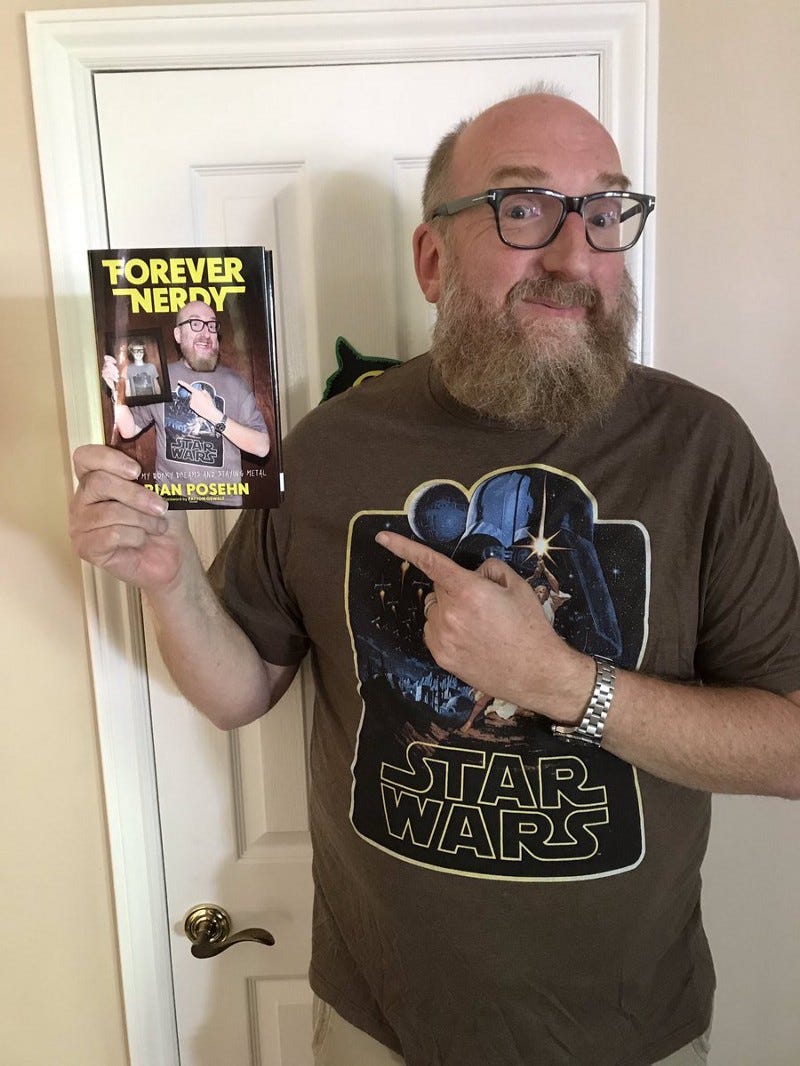Brian Posehn’s Forever Nerdy Makes You Feel Less Alone
The 2018 memoir is full of relatable stories for true nerds.
Stand-up comedian Brian Posehn has always been known for being nerdy. He’s done Star Wars material on more than a few of his specials and albums. He’s written a line of Deadpool comics. He’s released heavy metal tracks under the name Grandpa Metal. He hosts a Dungeons & Dragons podcast. But none of his projects to date have embraced his nerdom as strongly as his 2018 memoir Forever Nerdy: Living My Dorky Dreams and Staying Metal. In the book, Posehn sticks to the usual autobiography stuff with childhood growing pains, inspirations and obsessions, and his career trajectory into stand-up comedy.
But what makes Posehn stand out from the crowd is his killer comedic perspective. In the forward, comedian and friend Patton Oswalt writes “He loves things in a lovable way. But what’s better is: He hates stuff in a hilarious way.” I think that’s really a great way to sum up this book. For example, Posehn writes about his love of heavy metal all throughout the book. Some chapters are solely decaded to the bands Kiss, Metallica, and Rush — but don’t get him started on the Pandora algorithm that doesn’t truly understand their music. And forget about anything new and glossy, like Imagine Dragons.
Much of his story is uniquely his. For instance, his father died when he was two years old, (Yes, he does somehow pull off making that funny). Before being a nerd was cool, he was making due with his dorky desires growing up in the 1970s. But what struck me the most about the book was when I felt like my experiences growing mirrored his, when I felt like I could relate. Growing up a nerdy kid with a single mother, much of what Posehn writes about spoke to me directly. He makes things that I did growing up (stress over the future of Star Wars or obsess over comedy albums to the point of memorization) seem universal, which can mean a lot to a dorky kid. I wasn’t the only one!
Posehn tells a few stories in the book that identically mirror my own adolescence. For example, as a kid, I would stay up much later than I was supposed to so that I could watch Saturday Night Live. A familiar experience for young comedy fans, yes. But Posehn practically makes it seem cool and almost like a rite of passage to spend those Saturday nights sleepy and without anyone to talk to about it on Monday. He writes a brief section on stumbling across the very first episode as it aired, forever changing his comedic outlook:
I found Saturday Night Live one night when my mom was out with Ken. I was supposed to be in bed by 11:30. I wasn’t. I was flipping around one night and found these funny people, the not-ready-for-primetime players. I didn’t know who they were, but I thought they were the funniest people I had ever seen in my life. The host was this really funny, mean hippie named George Carlin. I knew I wasn't supposed to be watching this, but I was hooked. I didn’t tell my mom about my discovery, but I did encourage more Saturday night date nights.
There are things that are cool about being a nerd now. Marvel movies are top-tier blockbusters. Game of Thrones was a fantasy novel series before it was a mega-hit. And as much as I hate to say it, The Big Bang Theory invented being adorkable. But what makes Posehn’s book particularly relatable to me is that it isn’t full of stories about mainstream nerdom. He might have grown up three decades before me, but his stories resonate. The rough middle school years. Developing your music tastes. Finding joy in great comedic bits. This is not the artificial nerdyness of pop culture. This is genuine. This is what it was actually growing up nerdy. It’s finding who you are through the things that you love. Posehn makes that feel authentically and honestly universal — making you feel a little less alone about your experiences. There’s nothing wrong with finding what you love and embracing it. Posehn wrote a whole book about it — and that book is fantastic.






